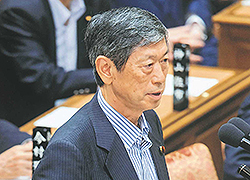
The House of Representatives Budget Committee held intensive deliberations on July 14 on the topic of "foreign policy and security policy." Representing the LDP, Party Vice-President Masahiko Komura asked about the cabinet decision on July 1 regarding the enhancement of the legal framework for security, and how the government interpreted it. "It is our duty to protect the lives and peace of the people." responded Prime Minister Shinzo Abe. "It is necessary to increase our deterrent force so that we can prevent conflicts from occurring." He emphasized the need to allocate a legal framework for security which provides for a seamless response.
At the beginning of his remarks, Vice-President Komura said, "It is an enormous misunderstanding to think that the right of collective self-defense can be exercised solely through a cabinet decision. I explain to people that this right can only be exercised after a bill is deliberated and passed by the Diet. For some people, it's the first time they have heard this." He therefore sought the government's interpretation of the matter, focusing on "allowing partial exercise of the right of collective self-defense."
Vice-President Komura chaired the "Ruling Coalition on the Development of Security Legislation," and in that capacity submitted three new conditions on the partial exercise of the right of collective self-defense. These conditions were explicitly stated in the cabinet decision (see reference).
"There are obviously limits to the measures that Japan can take," Prime Minister Abe said. "The Constitution does not allow the exercise of the right of collective self-defense in the same manner that it is permitted to countries under the U.N. Charter." He emphasized that exercise would be limited and grounded in the basic theory underlying the traditional government interpretation - the use of force is only allowed in the event of an armed attack on Japan.
"Are we right to think that a constitutional amendment would be required to allow Japan to exercise the same right of collective self-defense that is already allowed to China, South Korea, or North Korea?" Vice-President Komura asked in confirmation. Prime Minister Abe said clearly, "It would be difficult under the current Constitution to adopt an interpretation of allowing the exercise of force in excess of the basic theory underlying the traditional government interpretation. Doing so would require a constitutional amendment."
Prime Minister Abe was also asked about minesweeping operations in sea lanes, and noted the importance of the Strait of Hormuz (Middle East), prefacing his remarks by saying, "It is difficult to provide a general answer. Decisions must be made on the basis of the totality of the problem after examining individual circumstances." He went on to explain that there could be some situations in which these sorts of operations would be allowed, provided the three new conditions are satisfied: "There could be a situation in which global oil supplies are in shortage to the point of having a fatal impact on the lives of the Japanese people and threatening the existence of Japan itself. Such a situation would overturn the people's right to life, liberty, and the pursuit of happiness."
Vice-President Komura also commented on what would happen in the event of a resolution of the United Nations Security Council at a time when Japan was exercising the right of collective self-defense, and asked whether this would constitute an exercise of collective security.
Yusuke Yokobatake, Director-General of the Cabinet Legislation Bureau, responded, "A resolution of the United Nations Security Council may provide a rationale under international law, but under the theory of Japanese law, we would not be required to cease the exercise of force as long as the three new conditions are satisfied."
Closing his remarks, Vice-President Komura expressed support for Prime Minister Abe, saying, "The vast majority of the Japanese people support the Self-Defense Forces and the Japan-U.S. Security Treaty, but this was not always the case. In fact, public opinion was initially split on this matter. I believe the case for deterrence has stood the test of time, and I encourage you to continue to move forward confidently with these efforts to protect the people of Japan."
Measures for self-defense allowed under Article 9 of the Constitution
Three new conditions- In addition to an armed attack against Japan itself an armed attack against another country with which Japan has close relations that would clearly threaten the existence of Japan or the right of the Japanese people to life, liberty and the pursuit of happiness
- Lack of other appropriate means or measures to eliminate this threat, provide for the existence of Japan, and protect the Japanese people
- Exercise would be limited to the minimum amount of force required
[Excerpt from the July 1 cabinet decision]
Existing conditions
- An imminent and illegitimate act of aggression against Japan
- Lack of other appropriate means of eliminating the threat
- Exercise of no more than the minimum amount of force required
[Excerpt from government response on September 27, 1985]










